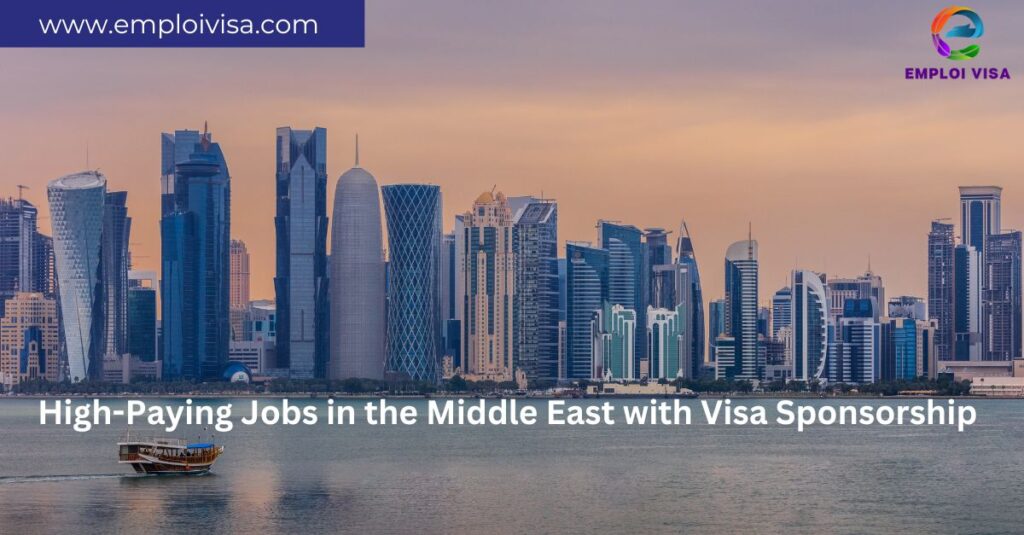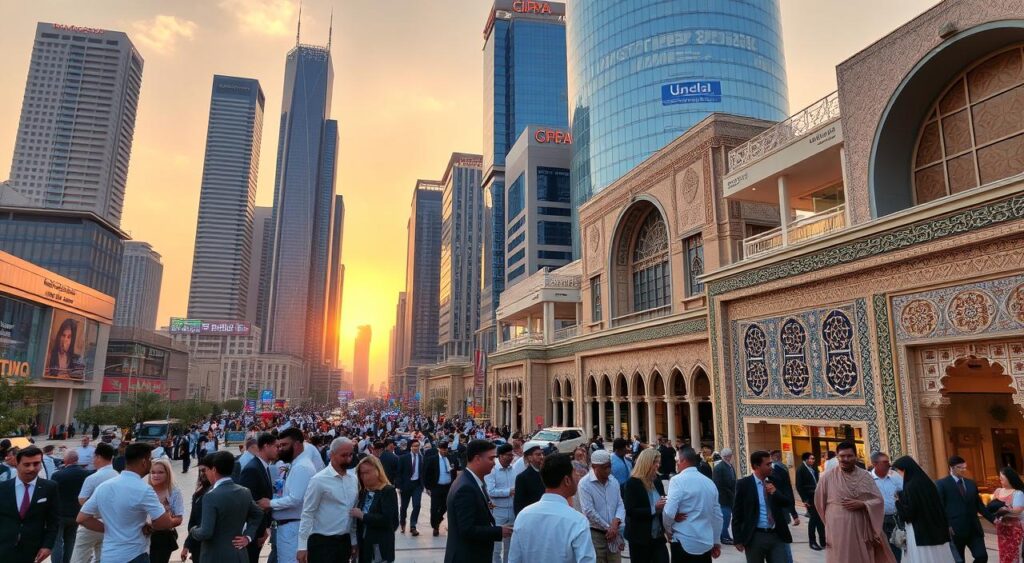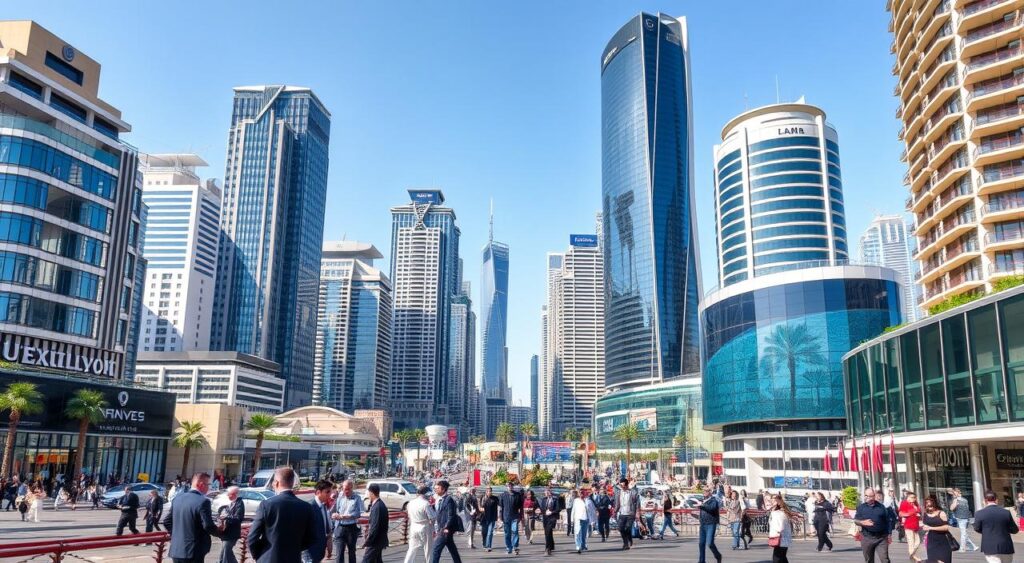
The Middle East is now a top spot for high-paying jobs, attracting expats from around the world. Cities like Dubai and Riyadh offer exciting career paths in various fields. This article will explore the best jobs in the Middle East that come with visa sponsorship.
It will also cover the local work culture and the great benefits you can get. These benefits can really boost your income.
Key Takeaways
- The Middle East offers a wide range of high-paying jobs with visa sponsorship, catering to diverse skill sets and experience levels.
- Understanding the local work culture, regulations, and professional etiquette is crucial for a successful transition to the Middle Eastern job market.
- Tax-free salaries, generous housing and transportation allowances, and comprehensive healthcare benefits make the Middle East an attractive destination for expatriate workers.
- The application process and visa requirements vary by country, so it’s essential to research the specific guidelines for your desired location.
- Expats who embrace the unique cultural experiences and adapt to the region’s work environment can thrive in the Middle East’s dynamic job market.
Understanding the Middle Eastern Job Market and Work Culture
To succeed in the Middle Eastern job market, you need to know the local business culture. The Gulf Cooperation Council (GCC) countries have their own set of rules and expectations. These include Saudi Arabia, the United Arab Emirates, Qatar, Kuwait, Bahrain, and Oman.
Cultural Expectations and Professional Etiquette
Business in the Middle East is shaped by Sharia law and “Wasta,” or personal connections. Building strong relationships and showing respect for those in charge are key. Also, being on time, dressing correctly, and following gender-specific norms are important.
Economic Overview of Major Middle Eastern Countries
The GCC countries’ economies mainly rely on oil and gas. But, they are also working to diversify. The UAE, Qatar, and Saudi Arabia are leading the way, offering jobs in finance, tech, and tourism.
Work Permit Requirements and Regulations
Foreigners need a work permit to work in the Middle East. Each country has its own rules and visa needs. It’s important to understand these laws and navigate the process to find a job.

“The Middle East is a region of immense cultural richness and economic potential, but it requires a delicate balance of cultural awareness and adaptability to thrive in the professional landscape.”
High-Paying Jobs in the Middle East with Visa Sponsorship
The Middle East is known for its booming job market. It offers great jobs in many fields. These include oil and gas, finance, engineering, healthcare, and IT. Many of these jobs come with visa sponsorship, making it easier for people to work there.
In the oil and gas jobs field, big companies in the Middle East look for skilled workers. They need project managers, petroleum engineers, and drilling supervisors. These jobs pay well, with benefits like housing and transport help.
The finance sector in the Middle East is also strong. Banks and investment firms hire people for roles like investment analysts and wealth managers. These jobs often have tax-free salaries and good health insurance.
For engineering positions, the region’s big projects and buildings need many engineers. Civil, structural, and mechanical engineers are in demand. They get good pay, help with moving, and bonuses based on performance.
The Middle East also has great jobs for healthcare professionals. Hospitals and medical centers need doctors, nurses, and other health workers. These jobs offer housing help and education support for family members.
The IT sector in the Middle East is growing fast. It offers jobs for software developers, cybersecurity experts, and data analysts. These jobs have good pay, chances for growth, and professional development.
No matter your skill, the Middle East has many high-paying jobs. These jobs come with visa sponsorship, making it a great place to grow your career and improve your finances.
| Job Sector | High-Paying Positions | Average Salary Range (USD) |
|---|---|---|
| Oil and Gas | Project Manager, Petroleum Engineer, Drilling Supervisor | $80,000 – $150,000 |
| Finance | Investment Analyst, Wealth Manager, Corporate Financial Advisor | $70,000 – $120,000 |
| Engineering | Civil Engineer, Structural Engineer, Mechanical Engineer | $60,000 – $100,000 |
| Healthcare | Physician, Nurse, Allied Health Specialist | $50,000 – $150,000 |
| IT | Software Developer, Cybersecurity Expert, Data Analyst | $60,000 – $100,000 |
The table shows some of the high-paying jobs in the Middle East. It also gives average salary ranges for each field. This info can help professionals thinking about moving to the region for their next job.

Benefits and Compensation Packages in Middle Eastern Companies
Exploring high-paying jobs in the Middle East? It’s key to know the benefits and compensation packages. These perks can greatly enhance the appeal of expatriate jobs.
Tax-Free Salary Structures
Working in the Middle East offers a big plus: tax-free salaries. Expatriates get to keep all their earnings, without income taxes. This means more money in their pockets than back home.
Housing and Transportation Allowances
Middle Eastern companies give out great housing and transportation allowances. These help cover rent, utilities, and even car costs. This ensures a good life without extra financial worries.
Healthcare and Insurance Benefits
Healthcare and insurance are top-notch in Middle Eastern jobs. Expatriates get medical coverage and access to excellent healthcare. Life insurance and other benefits also add to their financial security.
| Benefit | Description |
|---|---|
| End-of-Service Gratuity | Employees in the Middle East get a big payment when they leave. It’s based on how long they worked and their last salary. This is a big financial help. |
| Annual Leave | Middle Eastern companies offer lots of paid vacation time. Some give up to 30 days. This lets expatriates enjoy the region’s culture and take breaks. |
Understanding the benefits and compensation in the Middle East helps job seekers make smart choices. They can seize the opportunities in this vibrant region.
Application Process and Visa Requirements
Getting a work visa for high-paying jobs in the Middle East is key. Each country has its own rules, but knowing the basics helps. This makes the journey smoother.
The work visa application starts with the employer in the Middle East. They must submit your resume, education, and work history. They also need to get a attestation from the government, proving your job and skills.
- Medical examination: You might need a detailed medical examination to meet health standards for the visa.
- Residency permit: After getting the visa, you’ll need a residency permit to live and work legally in the country.
- Entry visa: You might also need an entry visa to enter the Middle East for work.
Every country in the Middle East has its own visa and documentation requirements. It’s crucial to check the specific rules for your destination. Getting help from a visa service or lawyer can make things easier.
The work visa application and residency permit process can take a while. Plan ahead and be ready for all the steps involved.
Living and Working in the Middle East: Expat Experiences
Starting an expat life in the Middle East is exciting and full of new experiences. It involves cultural changes and great opportunities. Expats find themselves growing both personally and professionally as they explore Middle Eastern cities.
Adapting to the Middle East’s cultural norms is a big challenge. Learning about respect, hospitality, and etiquette is key to making friends with locals. Knowing local customs, dress codes, and how to communicate helps expats fit in well.
Many expatriates choose compound living for its comfort and security. These gated communities have amenities like gyms, schools, and social events. They make it easier for families to adjust.
The cities of Dubai, Abu Dhabi, and Doha are full of life and culture. Expats can enjoy the markets, try local food, and learn about the area’s history. It’s a chance to dive into Middle Eastern life.
“Living and working in the Middle East has been a truly transformative experience. The blend of ancient traditions and modern innovations is captivating, and the warmth of the people has made this place feel like a second home.”
Expats face cultural and professional challenges but find rewards in the Middle East. This region offers many opportunities for those ready to explore and adapt. It’s a place of constant change and growth.
| Key Considerations for Expats | Insights |
|---|---|
| Cultural Adjustment | Understanding and respecting local customs, etiquette, and communication styles is crucial for seamless integration. |
| Housing and Amenities | Compound living offers a secure and community-oriented lifestyle, with access to various amenities. |
| Leisure and Exploration | Middle Eastern cities provide diverse cultural experiences, from vibrant souks to renowned cuisine. |
Conclusion
The Middle East is full of chances for professionals looking for well-paying jobs with visa sponsorship. You can find tax-free salaries and great benefits. But, it also has its own cultural challenges that need you to be flexible and open-minded.
By diving into international experiences and networking, you can grow your career fast. Being able to handle different work settings and cultural differences is key. Plus, the financial perks like tax-free income and good health care help secure your future.
Choosing a high-paying job in the Middle East is a big decision. It depends on your personal goals, what matters most to you, and how comfortable you are. But, for those ready to take on new challenges, the rewards are huge. The Middle East is a vibrant place for those wanting to explore the world and advance their careers and wealth.
FAQ
What are the top-paying jobs in the Middle East with visa sponsorship?
The Middle East has many high-paying jobs in fields like oil and gas, finance, engineering, healthcare, and IT. These jobs often come with great benefits and help with visa sponsorship. This makes them very appealing to people from other countries.
What is the work culture and professional etiquette in the Middle East?
The Middle Eastern work culture is shaped by Islamic traditions and “Wasta” (personal connections). It’s important for expats to know about dress codes, work-life balance, and networking. This knowledge helps them fit in well at work.
What are the typical benefits and compensation packages offered by Middle Eastern companies?
Middle Eastern companies offer great benefits like tax-free salaries, housing and transport allowances, and health insurance. They also give end-of-service bonuses. These benefits aim to keep the best talent from all over the world.
What is the visa application process for working in the Middle East?
To work in the Middle East, you need a job offer, a work permit, and a medical check. The company you work for helps a lot with getting your visa and residency permit.
What is the day-to-day life like for expatriates working in the Middle East?
Life for expats in the Middle East can be both rewarding and tough. They have to get used to local customs, meet new people, and find good places to live and schools for their families.






